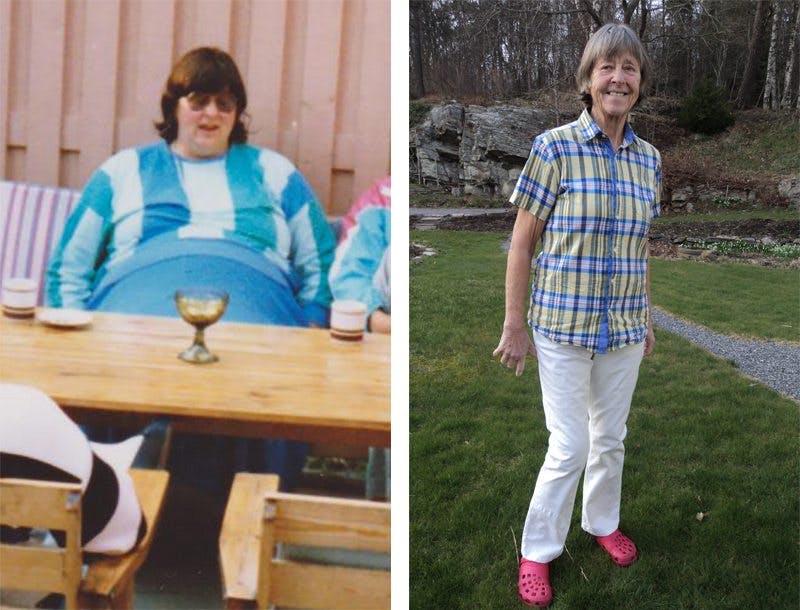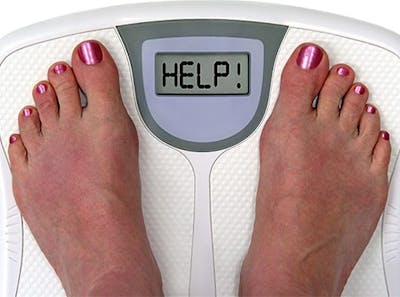“I feel great and strong and life is good”

Before and after
What a change!
Ingegerd Salomonsson has an experience that many others share: Her obesity was associated with pregnancies. When she was young she was lean, but during three pregnancies she gained a lot of weight. More than most. She ended up weighing 309 lbs (140 kg) and probably also had type 2 diabetes.
After trying to lose weight in many ways, as early as in the 80’s she was given the opportunity to undergo weight-loss surgery (gastric banding). She lost a lot of weight – but over the years it came back. A second weight-loss surgery (gastric bypass) produced weight loss again – but again the weight began to creep back up over the years.
What do you do when not even two weight-loss surgeries solve your weight problems?
Finally Ingegerd found what worked for her – without new surgeries or medications. A lifestyle change brought all her health markers up to perfect and her weight fell back to where it was when she was young. And even though this lifestyle change is controversial her doctor approves and thinks she should continue.
Here’s her story:
The Email
My weight journey (in short)
I was born during World War II. When I grew up it was unusual for children and adolescents to be overweight. We simply couldn’t afford to eat too much and we usually ate at regular times. When I graduated in 1961 I weighed below 132 lbs (60 kg) even though I was 5’10” (179 cm) tall. But I remember that nobody thought I was skinny. That same summer, I met my future husband. We got married and had three sons. During the pregnancies I gained a lot of weight without losing much between each child. For each year I gained weight. At the most, I weighed 309 lbs (140 kg).In 1987 I saw an ad in the newspaper that our hospital was looking for obese people who were willing to participate in a project. During the years I had tried to diet in all sorts of ways – but failed. Same old same old: lose a few pounds only to gain them back and then some after a while. I was next to desperate and saw this as a last resort. I was selected for the project!
All participants underwent a lot of testing. Today, as I look back at the results, I’m surprised that I didn’t understand that I was on track to get type 2 diabetes. I was well above the normal range for serum insulin. When I was at my heaviest, I had a urine glucose of 650 mg/dl (36 mmol/l). Why didn’t the doctors let med know what these numbers meant? I don’t remember that I ever met someone with type 2 diabetes at the time. This was almost 30 years ago. Now I know many people with this disease.
My first surgery entailed putting a plastic band around the stomach. That way I couldn’t eat large quantities. I lost a lot of weight, down to 160 lbs (73 kg), but then I started gaining weight again. The plastic band expanded and eventually disappeared altogether. I was offered to redo the surgery but in a different, new way that would be more effective. What choice did I have? From what I knew then about weight loss, this was my only option. Had I not agreed to this surgery, I would probably not be alive today. Possibly in a wheelchair with diabetes and cardiovascular disease. My situation was that desperate.
They performed a gastric-bypass surgery. Once again I managed to lose weight and my health markers were basically good. Great joy! I felt young, healthy and strong. My husband and I moved to Brazil in 2003. We were then retired but worked part time with, among other things, tourism. Slowly, but surely, both my husband and I gained weight. We used to spend summers in Sweden with friends and family. Of course we wanted to be lean and nice when we went home. We succeeded partially – temporarily. We both weighed around 187 lbs (85 kg).
When we visited one of my sisters and her husband, we were surprised how much leaner they had become. This was the first time I heard about LCHF. They praised this diet. It was as if they had found a new religion. When I said that you have to eat fruit and vegetables to get enough vitamins and antioxidants, they claimed that you get all the nutrients you need if you stick to meat, fish, eggs and butter. I pointed out, of course, that they would suffer heart attacks from all the saturated fat.
“Saturated fat is the best for the human body,” replied my brother-in-law. He told me about Annika Dahlqvist’s and Sten Sture Skaldeman’s books. I bought the books. Erik, my husband, read Skaldeman’s book and I read Annika’s. Erik thought Skaldeman’s book was fun to read and the picture on the cover with the thin man standing with his much over-sized pants really caught his interest. I felt Annika’s book was insightful. Could this be true? I started to think. Before we traveled to Sweden that year I had excluded some foods to lose weight: beer, rice and flour. Simply because it was just empty calories. I had actually lost 12 lbs (5 kg) and was proud of it. There were actually a lot of carbohydrates that I had not eaten and this served me well.
When we came back to Brazil in September 2008, we decided to try LCHF. It couldn’t possibly be dangerous to try for a while, anyway? Said and done. Instead of skim milk, cereal and fruit or juice for breakfast, it was eggs and bacon. For lunch and dinner: meat, fish, eggs and butter. Heavy whipping cream was not available in Brazil, otherwise I would have liked to have some in my coffee. Both Erik and I lost a lot of weight. After a couple of weeks Erik mentioned that he hadn’t taken a single acid-reflux medication for several days. For decades he had taken daily medication for acid reflux. Could this be caused by food? He also noted that he had never eaten food this tasty on a daily basis before. We were excited and happy about gaining health and losing weight.
But a rage and despair grew more and more within me. I’d been eating the wrong foods for decades because I had trusted our official guidelines. With the best intentions I had given our children the wrong foods. Fortunately, our children have consoled us that we didn’t have a chance to know better. Even Annika Dahlqvist, who is a doctor didn’t know better, but has had to change her mind. We continued our low-carbohydrate diet. Although not very strict. I got a can of ketone and blood-sugar strips. I went to strict LCHF and measured blood ketones. But one day I bought a big soft ice cream with chocolate sauce. “It can’t be that bad,” I thought. When I got home I tested to see if I was still in ketosis. To my great surprise the strip indicated urine glucose. Then I got scared and got myself a blood sugar monitor and went back to strict LCHF.
I have learned, I think, what I can and can’t eat to keep me healthy. But one day last summer, when I was home alone and didn’t want to cook, stupid as I was, I took a couple of rye bread slices with plenty of butter and cheese on top. I thought that with that much fat on the bread, my blood sugar wouldn’t rise that much. After about half an hour I measured my blood sugar. To my horror it had risen to over 234 mg/dl (13 mmol/l). I also tested positive for glucose in my urine. Finally, I’ve understood that I have to keep a strict LCHF diet. I think of it as being hyper-allergic to carbohydrates. Actually, I no longer feel any cravings for the fruits, sandwiches, pastries or sweets that I used to like so much before.
Here’s a very brief account of my medical contacts in recent years: In 2010 when we moved back to Sweden, I was at a doctor’s visit and had lots of blood work done. What I especially remember from the visit is that my blood pressure was 110/60 and the doctor said I should continue with my lifestyle. I didn’t dare to tell him that I ate LCHF as I had heard how controversial it was and also had not yet discovered what a runaway blood sugar I had. In early summer 2014 I saw a different doctor, as we had moved to another city. This doctor too wanted a lot of testing because I had undergone gastric-bypass surgery. I told him that my blood sugar shoots up if I don’t take care. The doctor replied that my present blood sugar and long-term blood sugar were both fine. “That’s because I’m hardly eating any carbohydrates, I’m on a strict LCHF diet.” “Then I think you should continue with that”, he replied. All test results were fine this time too.
Today I weigh about 141 lbs (64 kg) and am 5’9″ (176 cm) tall. I feel great and strong and life is good.
A big thank you to all of you who’re working with this!
It has meant a lot to me!
Sincerely,Ingegerd Salomonsson
Comment
Congratulations on your health and weight improvements, Ingegerd!
Many people wonder if you can eat LCHF even after weight-loss surgery and I’ve had many stories from people who successfully do so. It seems to be an excellent way to prevent the weight from creeping up again over the years.
Share your story
Do you have a success story you want to share? Send your information, plus before and after photos, to success@dietdoctor.com. It would also be greatly appreciated if you shared what you eat in a typical day, whether you fast etc. More information:
Share your story!Below, find out what you can do if you want to try LCHF for yourself, as well as stories from others who have tried.
More
“Hello LCHF – Goodbye Type 2 Diabetes”


